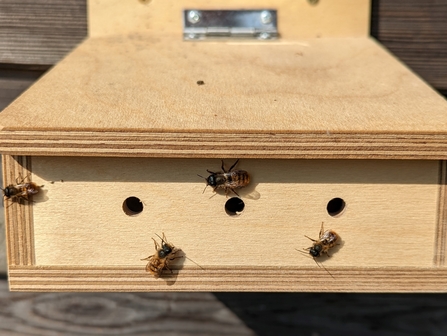As we move into the summer months, many of you will see and hear the buzzing of our nation's bees, from bumblebees to solitary bees. Watching a bee visit your garden or cross your path on a local walk is simply magical.
Most people are familiar with honey bees, but there are over 20,000 bee species worldwide and in the UK we have 270 species including 24 bumblebee species and 1 honey bee species. The rest are solitary species, many of which you may spot in your garden or green space such as the ashy mining bee, leaf-cutter bee and tawny mining bee.
The focus for this blog is the red mason bee, a small gingery bee that doesn’t sting. Recently, you may have spotted at our Nature Discovery Centres and Parks some new installations. Essex Wildlife Trust have joined the Mason Bee Guardian cocoon-sharing project to combat the decline of these amazing bees in the wild.


